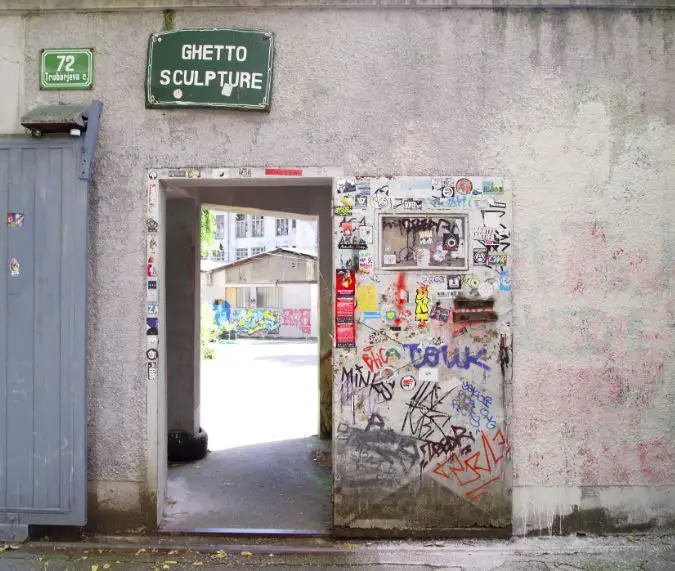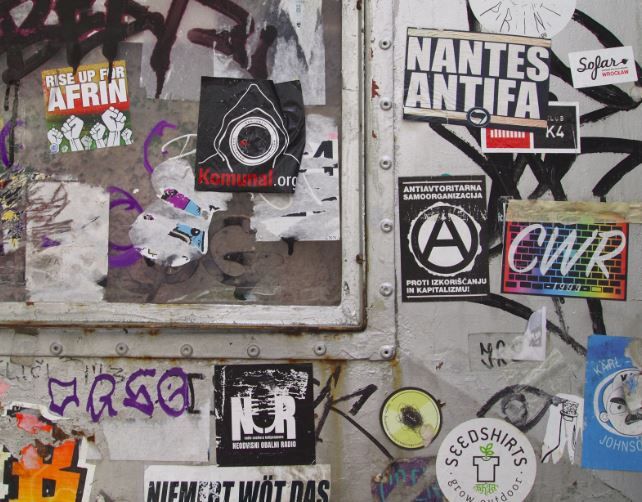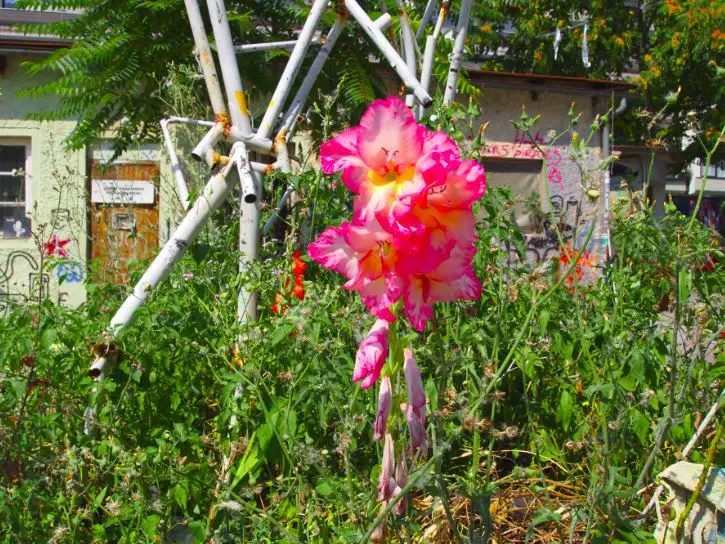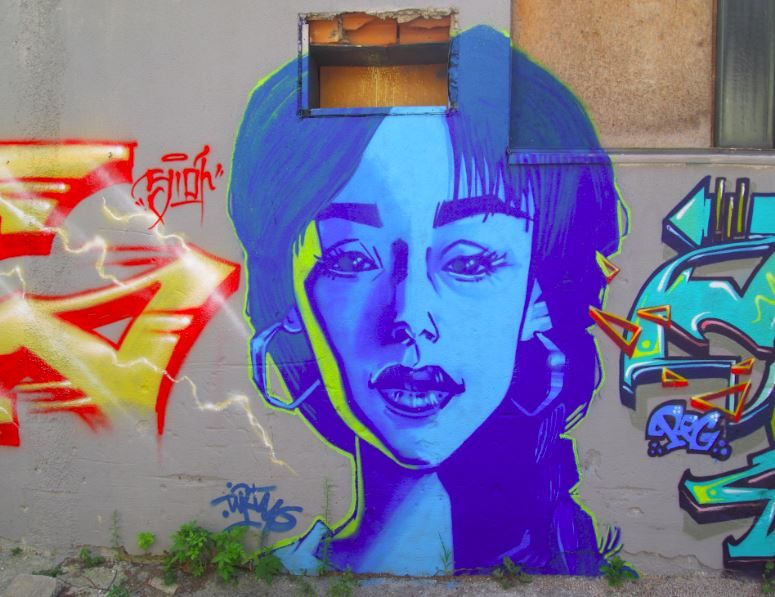July 31, 2018
If you’ve ever walked down to the far end of Ljubljana’s Trubarjeva cesta and come across the long wall of large-scale graffiti and then the rather curious entrance to Tovarna Rog, with its concert posters, guardhouse and tempting glimpses of sculptures in what seems to be garden cum courtyard, then you might wonder what goes on at this former bicycle factory, which once produced the iconic (and highly desirable) little Pony cycles.
The entrance to Rog. Photo JL Flanner
Well, the short answer is quite a lot, in a variety of fields, and to learn more about some aspects of this we sat down with Zana Caroline Fabjan Blažič, of the group Ambasada Rog, to talk about her work there. We met in the café of the nearby Moderna galerija’s Metelkova branch, recently opened and staffed by new arrivals in Slovenia, which naturally led to our first question.
Do you have anything to do with this café?
We helped open it, actually. It was the museum’s idea to have a café, and then they thought why not include refugees in running the place. So they provided the infrastructure and we made a team through our networks, so now four people are working here. Three refugees and one Slovenian who helps with the organisation.
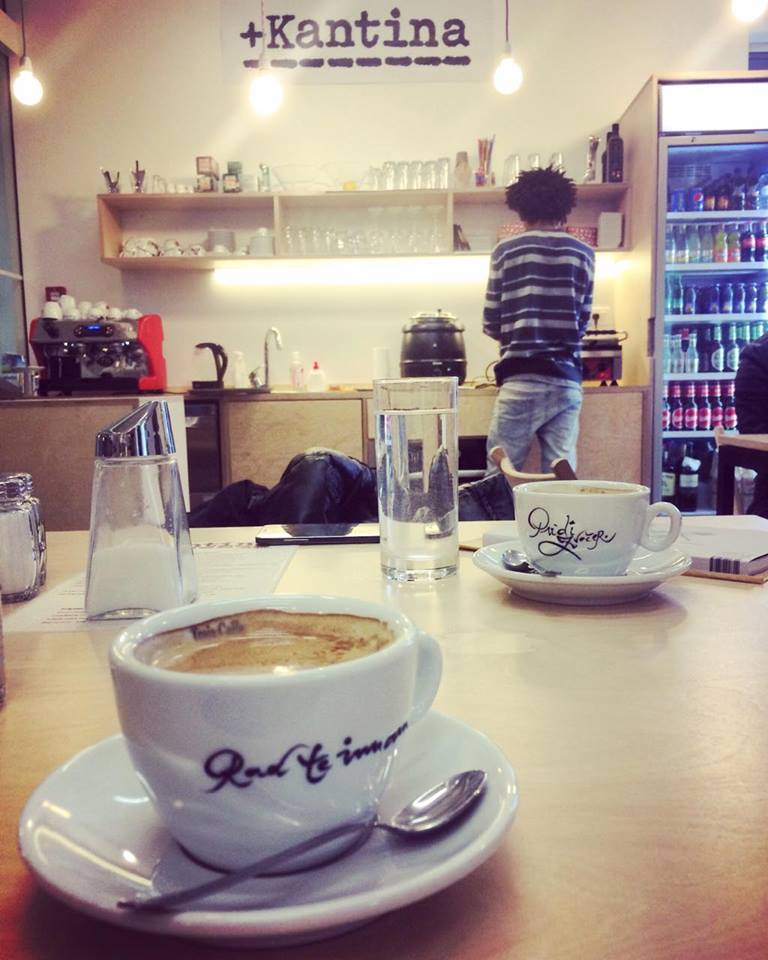
The gallery café. Photo: The Kavarna's Facebook
Can you say a little about Ambasada Rog and the work you do there with refugees and asylum seekers?
It’s a social and community centre with one floor in Rog that’s run by both activists and refugees. We’re not really a formal group, not an NGO, and our main goal is political activism. So we do some work on integration but it’s a side effect, not the main goal.
We started as a group called Anti-Racist Front Without Borders, which had student socialist groups to anarchists to different people working there on various forms of social activism
Some of the stickers at Rog. Photo: JL Flanner
At the beginning we did some protests on related issues, but when the Balkan Route turned through Slovenia in 2015 we went to the border and started doing some work there. Then at one point when the border crossings began to be more organised by the state we were, let’s say, excluded, so we started working with people who asked for asylum in Slovenia.
First we just organised some parties and dinners, and invited people from the asylum home. This was an opportunity to make some connections and get to know each other. So we asked them what do you need, and they said, OK, we need language courses. We were the first to offer those, and after that other groups started to do the same. This happened a lot. Something was needed and we were the first to offer it, and then gradually more official organisations started doing the same, so we moved on to the next thing. We’re still working with the same group of people from three years ago, actually, and now they speak Slovene and English.
Photo: JL Flanner
Does funding for the work come from the parties you run at Rog and Metelkova?
No. Basically the parties don’t make any money, and we’re not very good at fundraising, so we use our savings. We also don’t want to take any government money or EU projects, because they tell you too much what to do and how to do it.
Two years ago we were actually part of a project, but all the bureaucratic work started taking too much time and energy, and we were offering these workshops that were not useful for anybody. We wanted to get some money out of the project so that we could, for example, support some refugees who don’t have status and don’t have any social money, so we could pay the rent for them. But the way the budgets are given you can’t do that. You can buy equipment and you can have somebody employed, but not a refugee. You can’t give money to refugees because they’re just supposed to get knowledge, only that.
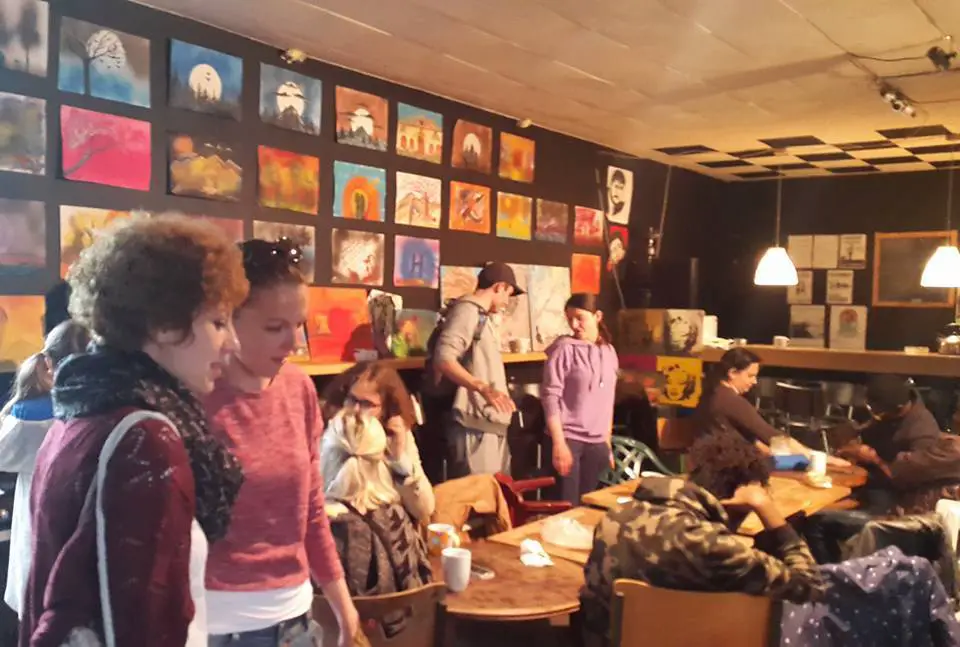
Photo: Ambasada Rog
How has the work evolved?
After some time we formed into three workgroups. One was the workgroup for asylum, one for media and one for going around Slovenia, to high schools, social centres and so on, and talking about anti-racism. This wasn’t a formal organisation, but rather a coalition, and now we have a different form, although with a lot of the same people. Things changed because at one point we realised that we were trapped in solving the individual problems of individual refugees.
What kind of problems?
Too many, but, for example, refugees in Slovenia have one lawyers office that’s supposed to represent them, but it’s a little bit problematic. It’s paid for by the Ministry of Interior for fighting the Ministry of Interior, which limits what they do.
When a refugee gets asylum refused for the third time there’s no more legal help for them, so we take over. So we’re working with Ahmed now. His case is complicated. He was supposed to be deported within six months, then that order got cancelled. We went to court and they said now Slovenia has to take responsibility for him, but then the Ministry (of Interior) said no, the deadline wasn’t cancelled, just postponed. We objected to that, and won, and then the Ministry went to the High Court, and so on.
Ahmed’s the most complicated case we’ve had, and in general the legal situation with individual cases takes up too much time and energy, while at the same time the overall situation is getting worse, so now we’ve moved our focus to the latter. And we don’t just focus on refugees, but combine various topics and areas of activism, like the rise of fascism, and we try and connect the struggle of refugees to the workers’ struggle, making it more political in general.
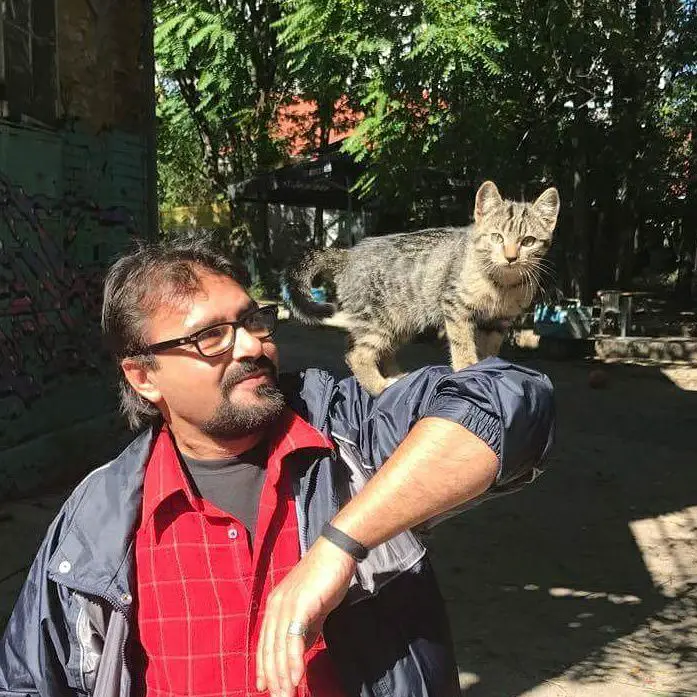
Ahmed and Susu. Photo: Ambasada Rog's Facebook page
Has there been a clear rise in anti-immigrant feeling?
The neo-Nazis are anti-immigrant, but it’s not that the extreme groups are getting stronger, more that the mainstream is becoming more extreme, especially the media. Things that would have been unacceptable to say a few years ago and now OK. Even the national TV, RTV MMC. They have the worst stories, and I’m shocked. Sometimes the right-wing media is even better. Not good, but they give more context.
For example, Amnesty International and PIC published a report about refugees being pushed back from Slovenia, based on hundreds of interviews [Ed. read our report here]. So MMC just calls the police, who say it isn’t true, and that’s the end of the story. Just copying the police statement without putting it into any context isn’t good journalism.
In general, do refugees want to stay in Slovenia?
No. For the last 25 years Slovenia has been a transit place, except for 2015 and 2016, and many of those who arrived then have been here for two years or more and made lives here, so they want to stay, a surprising number, perhaps. But before that and in the last year or so I’ve hardly met any new refugees. Most of them come, stay here two days, and then move on.
Most people whose asylum request is rejected go to another country, to France or Germany. They hear many bad things about Slovenia, so they don’t want to stay.
Photo: JL Flanner
What work do you do on the border?
One of the deep goals we have is to mobilise people on the border, Belja krajina, against the barb wire fences. A problem is that people from the Ministry of the Interior go down and make the people sign papers saying they agree with the wire, and give them some guidelines what to do if they see a refugee. Such as don’t give them food and do call the police, like what to do if you see a bear in the forest, that kind of thing.
There’s been over 40 people who drowned crossing the River Kolpa, and the Ministry goes there and tells people that the water is contaminated because of the bodies, so just sign here and we’ll put up more wire. Two years ago people were really against the wire, but then the police went from house to house and made them afraid, even fined people for helping refugees. So our idea is to go there and make people angry again.
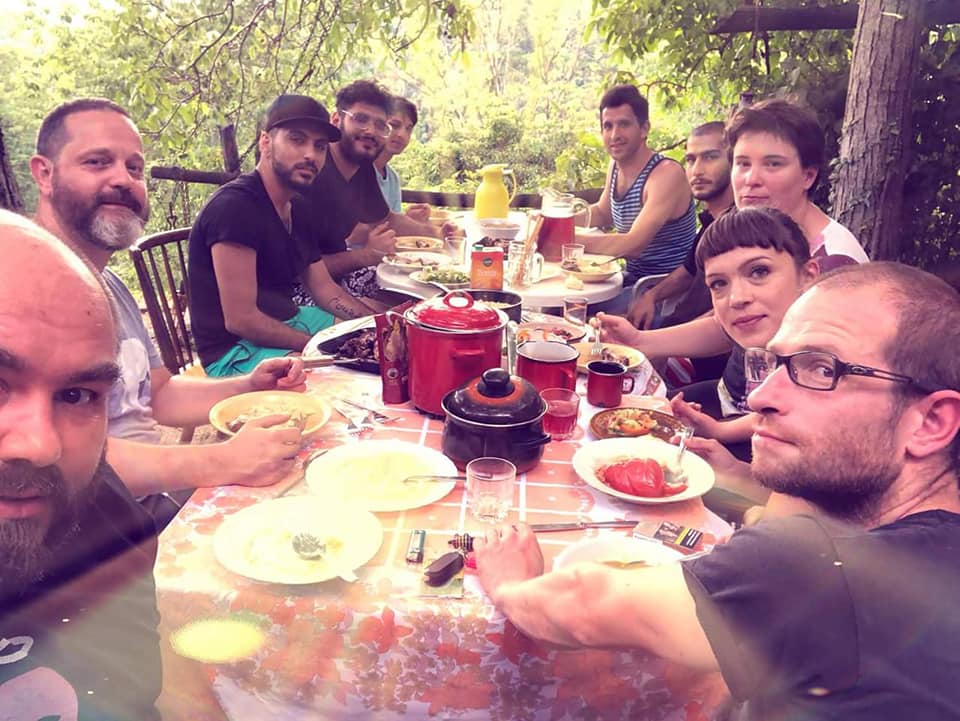
Photo: Ambasada Rog
And what about Rog?
Ambasada Rog is a big place. We have lunches there in the day and parties there at night, there’s workshops, music table football, a hang-out place. We have a kitchen, and every day, Monday to Friday, we have lunch for free with different people cooking. We run these lunches based on donations, and refugees don’t have to pay anything but can contribute with their help in the kitchen. At first we wanted it to all be run by refugees, but now activists, refugees, others, we cook together, clean together and so on.
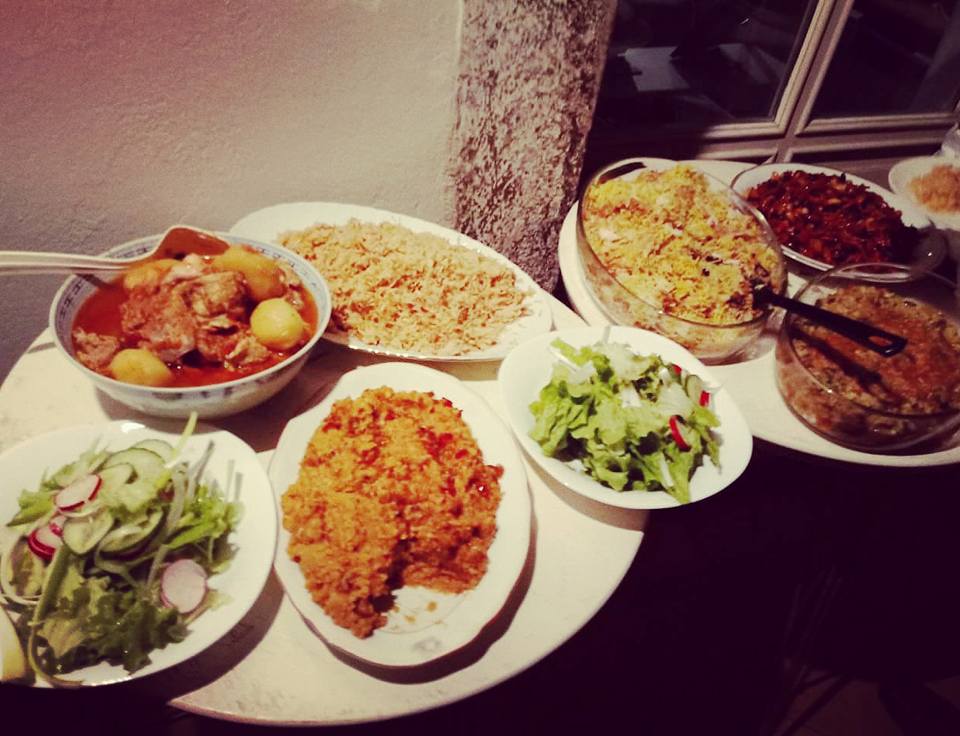
Photo: Ambasada Rog's Facebook page
Rog always seems to be under threat, what’s the current status?
Now we’re in the court, being sued by the mayor. Two people were told they have to move out, but even when all the people they’re targeting now have to leave, me included, the court’s decided that we’re not responsible for the others, so what happens then? If they try to evict us they have no legal basis for it. If the city wants to do it they have to get more than 200 names and throw everyone out, then they can reclaim the property and try and sell it.
Do you have squatter’s rights?
We have “property keeper’s” rights. When they came two years ago we filed a lawsuit against the municipality for disturbing the property, then they sued us for illegally taking a property. So there are two sides, the property owners, the Municipality, and the property keepers, us. And we won that status because we’ve had the property for 12 years. But they’re the property owners and their rights are stronger.
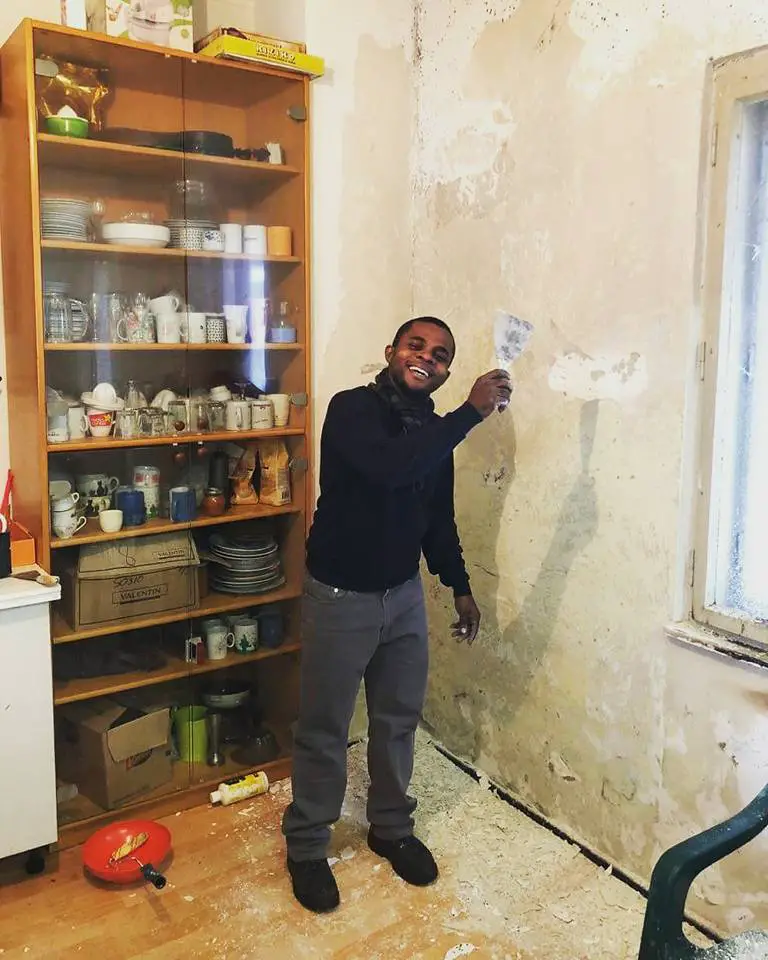
Redecortating. Photo: Ambasada Rog
What’s your goal for Rog?
Ultimately we want a similar status to Metelkova. That they recognise we’re there, recognize our activities, that they even help us with infrastructure, such as give use electricity. Right now we have a generator, and we have good connections with Legebitra [an LGBTQI+ activist group], who are next door. They give us their internet passwords and we organise some events together. It’s a nice relationship, because one line from the Right is that refugees are against women’s rights, against gay rights, and so on.
How many asylum seekers come to Rog?
When the asylum homes were full we’d get 150 people coming to the parties, but now it’s maybe 20 who come every day, 30 or 40 who come every week, and sometimes we have some bigger events, when families come.
Most of the people we work with now have been here a long time, so they have status, jobs, school. That’s why they’re not at Rog all the time. Before they came because the alternative was just sitting in the asylum home, or walking around town, but they only get €18 a month, and you can’t enjoy Ljubljana with this. Rog is one place they can come and drink tea, coffee, and have an affordable social life. That said, we also have some people without status, in a much worse situation, and those are the people who spend more time there.
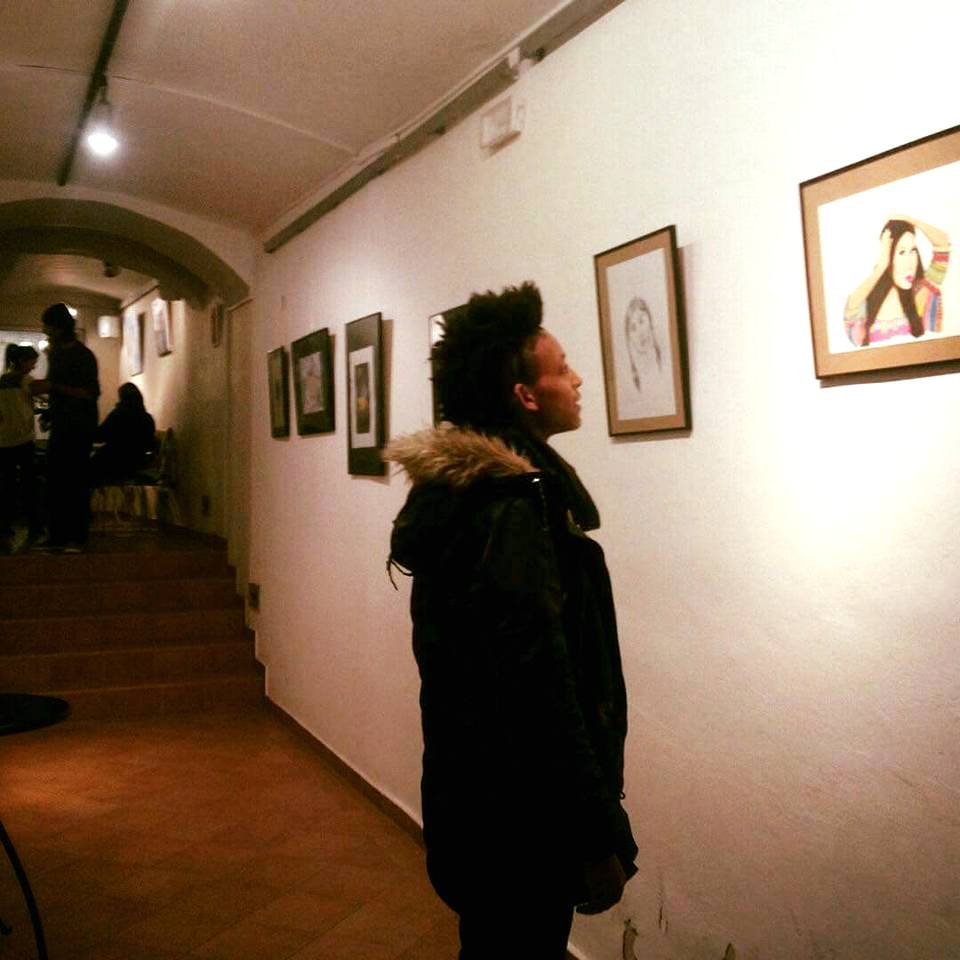
Photo: Ambasada Rog
Finally, can tell us a little about your work as a DJ?
I started as an electronic DJ, but in 2010 I moved on to Bollywood music and I’ve been organising Bollywood and bhangra parties since then. First the parties were going on in Jalla Jalla, but later they got bigger, so we moved to Gala Hala.
Now I have a DJ team from Ambasada Rog, me and a few refugees. One guy from Syria is also playing Indian music with me at my regular parties, but when we play at some different events he plays Arabic music, like dabke, and there is one guy from Iran who plays Persian music. Also a guy from Afghanistan who plays dance music from Turkey to India. Some others have also tried DJing, and we organise events with reggae, trap, blues, all sort. At Rog we have a computer, a mixer, and people can learn how to DJ there.
Who goes to those Bollywood nights?
At first it was the Indian community here, but then refugees started to come, and more Slovenians. In fact, we have a bhangra and Bollywood night tomorrow, you should come.
If you’d like to learn more about Ambasada Rog, then the best place to see more of what’s going on and make contact is probably the group’s Facebook page, here, while you can follow the events organised by Koncertna Dvorana Rog, which often hosts dance parties, here. Finally, for news on those Bollywood nights, and other events at Gala Hala, just click here.



